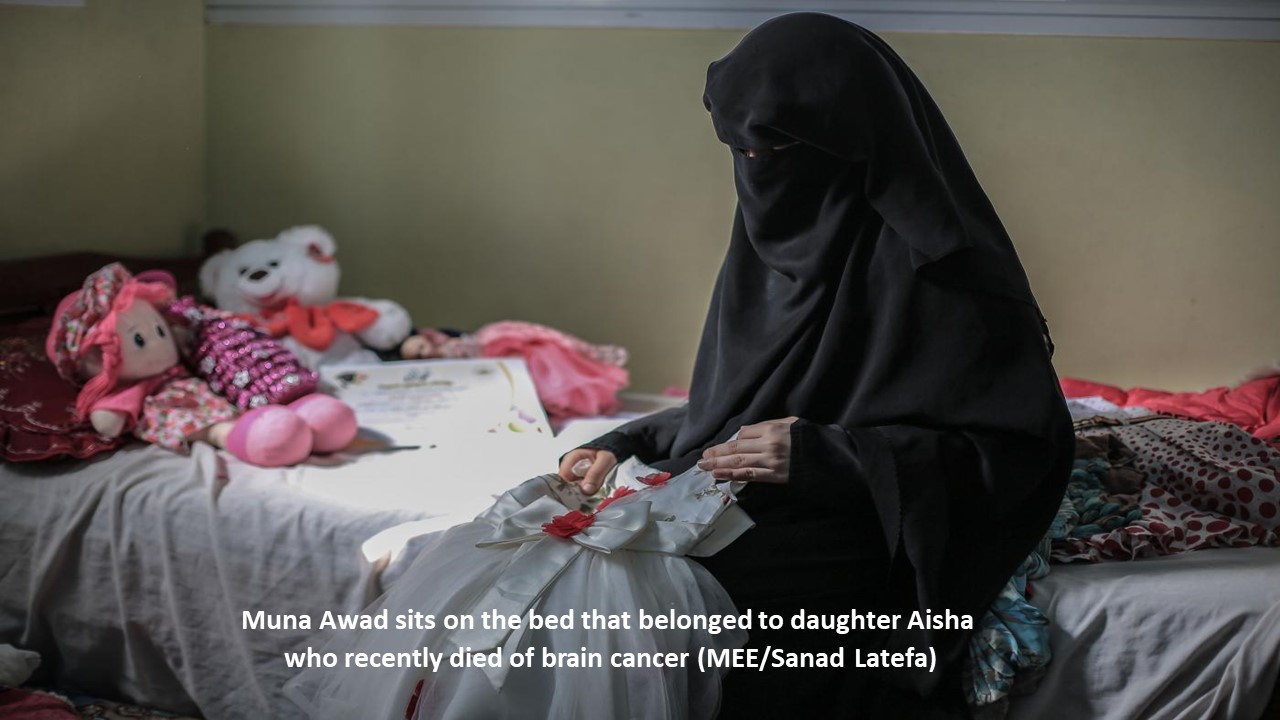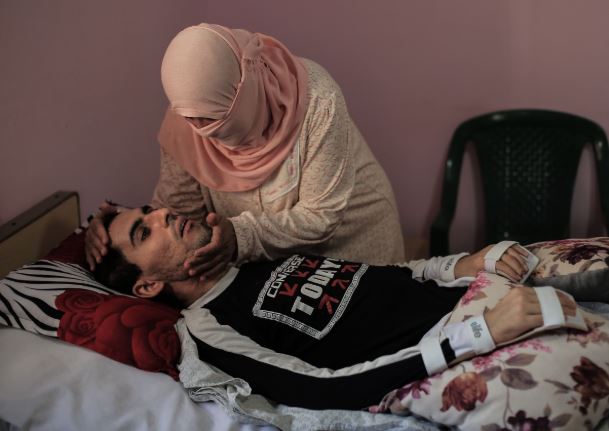Palestinians despair of Israeli restrictions to medical treatment outside Gaza

Families in Gaza say they are suffering a form of 'collective punishment', as medical travel permits are rejected or delayed
The air was thick with anxiety as Muna Awad stepped out of the taxi at the entrance to the Erez Crossing, her five-year-old daughter Aisha in tow.
Aisha was about to embark on a journey from the besieged Gaza Strip to occupied East Jerusalem for emergency medical treatment - and Muna was handing her young daughter over to a woman the family had never seen before to help facilitate her travel.
"I felt as if my soul was leaving my body," recalled Muna about being unable to travel with Aisha that day last month.
The five year old was diagnosed with brain cancer on 10 April.
The specialist hospital in Gaza that handles cancer patients told Muna it was ill-equipped to treat her daughter, and ordered her to be transferred to the occupied West Bank or East Jerusalem for urgent care.
While Aisha got a permit to leave Gaza within 24 hours, Muna said she was barred from accompanying her daughter, not granted a permit to leave the besieged Palestinian territory because she was under the age of 45.
"That was not my choice, but Israel's choice," said Muna.
"My shock was aggravated when I learnt that her father wouldn't be allowed to accompany her either because of his age... We were told that male companions must be above 55" years old, she added.
Searching for solutions
Aisha's father, Wissam, said he searched for solutions when he and his wife had their travel applications rejected.
He first asked his mother, Rifqa, 75, to apply for the companion permit, but Israeli authorities denied her application as well.
In the end, Israel allowed Halima Edaees - a Palestinian woman from al-Shati refugee camp in northern Gaza who had no previous ties to Aisha's family - to accompany the young girl.
Edaees offered to go with Aisha because she already held a permit to travel with another patient.
"Accepting the fact that my sick little daughter would travel without me was the most difficult decision that I have ever taken in my life," Muna said.

Letting Aisha travel for treatment without a loved one by her side was "the most difficult decision that I have ever taken in my life", her mother Muna said (Handout)
Aisha left the Gaza Strip on 17 April and arrived at al-Maqasid hospital in East Jerusalem, where she underwent an operation.
"We were happy when we were told that Aisha had a successful surgery and she was OK," Wissam told MEE.
"I have a friend in Jerusalem and I asked him to visit her and let us speak with her on Skype and he did... We spoke with her and she looked fine, but she suddenly went into a coma."
Aisha was transferred to Augusta Victoria Hospital, also in East Jerusalem, where she had several more surgeries - but, Wissam said, "she never woke up".
The little girl was sent back to Gaza, but remained irresponsive. She died on 15 May.
Thousands rejected or delayed
Aisha's story is not unique. Many Palestinians in the Gaza Strip have been unable to travel with their loved ones as they seek medical treatment outside the coastal Palestinian enclave.
In fact, according to the Gaza-based Al Mezan Centre for Human Rights, Israel only allows men above age 55 and women 45 years and older to accompany patients who need to travel outside Gaza for medical treatment.
The group said that 25,658 Palestinians applied for permits to seek medical treatment outside of Gaza last year. Of that number, Israeli authorities delayed processing or rejected outright 9,832 applications - some 38 percent of cases.
"These are very difficult conditions," said Yamen al-Madhoun, an Al Mezan field worker.
Mohammad Abu Silmiyyeh is the director of al-Rantisi hospital, which offers cancer treatment in Gaza. The doctor told MEE that the medical complications in Aisha's case may have been tied to the delays in her travel.
In fact, he said such delays have "fatal consequences in the cases of many patients in Gaza".
Lack of facilities, lack of equipment
While Gaza is home to a cancer treatment department and skilful medical specialists, hospitals in the coastal territory regularly send patients suffering from serious illnesses to the West Bank, Jerusalem, Israel or abroad.
There is a systemic lack of medicine and medical equipment in Gaza, due to the restrictions imposed under Israel's 12-year siege, Abu Silmiyyeh explained.
He said that lack of medical equipment makes it impossible to offer chemotherapy and radiotherapy, one or both of which are usually necessary for the treatment of cancers.
Add to that delays or bans on travelling outside of Gaza for treatment, and fears among some patients about being detained at Erez Crossing - the main crossing between Gaza and Israel - and medical patients in Gaza truly face a myriad of challenges, he said.
"The protocols for treating cancer are the same in Gaza as they are in the West Bank, Israel, Africa, America and everywhere else," he said.
"The problem we have is the lack of [tools]... including medicines and equipment."
Violating international law
According to Madhoun at Al Mezan, Israel is committing "flagrant violations" of international law by putting up roadblocks that bar or delay patients and their companions from freely accessing medical treatment.
"Israel violates the right to life for Palestinian patients, the right to freedom of movement and the right to access healthcare services," he said.
"These violations amount to flagrant violations of human rights and international law, and they are... collective punishment."
On 25 October last year, Mohammad Baraka, a 25-year-old agricultural engineering graduate from the village of Abasan in southern Gaza, was told he was suffering from a "non-dangerous" tumour.

Mohammad Baraka was diagnosed with a 'non-dangerous' tumour, but it became life threatening and he is now in a coma (MEE/Sanad Latefa)
Doctors in the Gaza Strip ordered him to be transferred immediately to al-Maqasid in East Jerusalem for medical treatment.
But after several delays, Baraka was only sent to Jerusalem on 9 December. By then, the tumour had become life threatening, his family said.
"He spent three months in Jerusalem. He had 11 surgeries, but unfortunately his condition deteriorated dramatically and he fell into a coma," his father, Azzazi, 57, told MEE.
After he was transferred back to Gaza, Baraka spent 40 days in local hospitals before being discharged because the facilities were unable to offer him proper treatment.
"And he has not woken up to this day," his father said.
Source: Middle East Eye

WRITE YOUR COMMENT